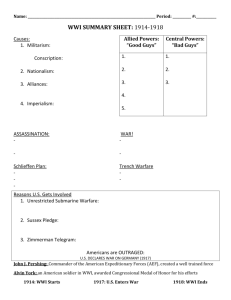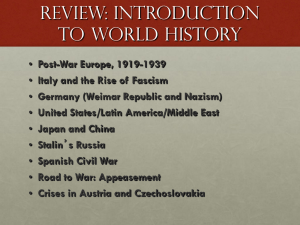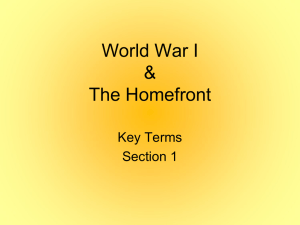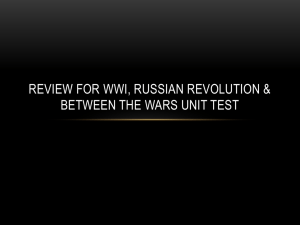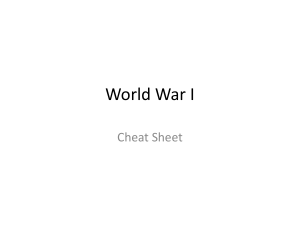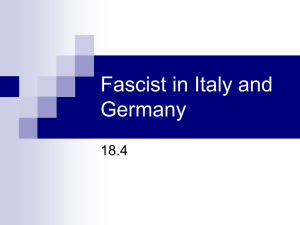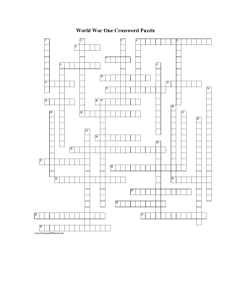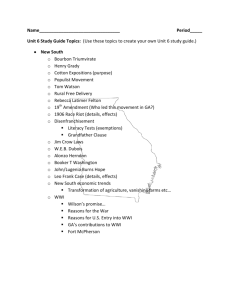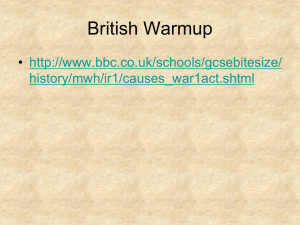Review: EUH3206
advertisement
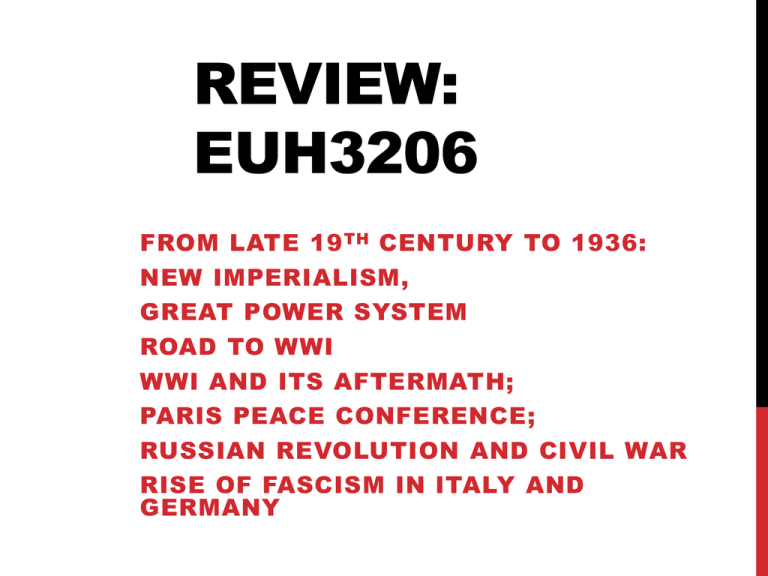
REVIEW: EUH3206 FROM LATE 19 TH CENTURY TO 1936: NEW IMPERIALISM, GREAT POWER SYSTEM ROAD TO WWI WWI AND ITS AFTERMATH; PARIS PEACE CONFERENCE; RUSSIAN REVOLUTION AND CIVIL WAR RISE OF FASCISM IN ITALY AND GERMANY READINGS: Conan Fischer, Europe Between Democracy and Dictatorship, Chapters 1-6 (relevant sections). Aspects of Western Civilization, Part II., Chapters 8-12 (relevant sections). Background material Intellectual/Cultural themes of the 19th century: Positivism – A. Comte, H. Spencer, K. Marx Liberalism – J. Bentham, J.S. Mill Conservatism – E. Burke, B. Disraeli, Joseph de Maistre Socialism/Anarchism/Marxism – Marx/Engels, K. Kautsky, V. Lenin, M. Bakunin, Peter Kropotkin th 19 Century Background Social Darwinism – T.H. Huxley, A. Gobineau (Racism) Nationalism – Italy, Germany, Balkan countries Imperialism: Africa (Scramble for Africa) and Asia (Unequal treaties, concessions in China) Background to WWI Great Powers and their relative position to one another: Germany, Italy, Great Britain, France, Austria-Hungary, and Russia. Alliances of Great Powers: Triple Alliance (Germany, A-H, Italy), 1882 Dual Alliance (France, Russia), 1894 Great Powers, cont. Entente Cordiale (France, Great Britain), 1904. 1907 (France, Great Britain, Russia) Types of alliances/diplomatic relations between 1879 and 1914? Why were these countries allied? Did these alliances create a web of interlocking commitments which led to war? Great Powers, cont. Causes of WWI: Diplomatic ties; militant nationalism; imperial tensions (Morocco, Bosnia, Balkan Wars, Military planning). Moroccan crises of 1905 and 1911 Bosnian crisis, 1908 Balkan wars, 1912-1913 Assassination of Archduke Ferdinand First World War, 1914-1918 How did war start? What was war about? What kind of war was it? (Stalemate/trench warfare, Total War, etc.) Role of propaganda Role of Home Front First World War What were the major turning points of the war: 1914 – Battle of Marne 1915 -- Unrestricted submarine warfare, Gallipoli 1916 -- Verdun, Somme 1917 -- Russia leaves the war US joins it. End of War 1918 – Treaty of Brest-Litovsk, German Spring offensive. Who won the war? Why did they win? Expectations of victors? Punish Germany, establish a “new” Europe based on Wilson’s 14 points (issued in January, 1918). Russian Revolutions, 1917 Russia during WWI and in the post-war era: Political/Social Background: Types of political parties on the left: Marxists (Bolsheviks and Mensheviks, SRs, Anarchists) Russian Revolutions, 1917Russian Revolution of March, 1917 – Provisional Government est., Soviets share power with new PG. October, 1917 – Storming of the Winter Palace, beginning of Bolshevik-led revolution Revolution and Civil War, 1918-1921 Opposing sides: Reds (Bolsheviks, Mensheviks, SRs, Anarchists) vs. Whites (monarchists, military, liberals, traditionalists) Reasons for Bolshevik victory? Party organization – “What is to be done?” Cheka – created 1917 Propaganda (Agit-prop) -- Posters, lectures, etc. Revolutionary Utopia: Winning over the people: ending the war, promising a new world… Leadership (Lenin, Trotsky, Stalin, Zinoviev, Kamenev, Bukharin). Red Army -- Trotsky Aftermath of WWI Significance of Paris Peace Conference, 1919-1920 (winners and losers, League of Nations, treaties, etc.) Treaties: Versailles, Trianon, Saint Germain, Sevrès. New Europe? What did it look like? What had changed? (Borders, new countries, new political systems, continuation of “old” politics…) New Countries: Baltic states (Estonia, Latvia, Lithuania, Balkan states (Yugoslavia), Czechoslovakia, Hungary, Austria, Poland. Map of Post-FWW Europe Aftermath of war, 1919Pros- and Cons- of Post War European Settlement: Diplomatic arrangements? Economic conditions? Political conditions in Victorious countries/Vanquished countries. Fate of Imperialism? (Middle East, Africa, Asia) Fate of Great Power system Italy in the post-war era: rise of fascism (causes and consequences, 1919-1934) What is fascism? Major ideological tenets: Statism, Corporatism, AntiEnlightenment, Belief in Violence… Role of Mussolini (Il Duce)? Germany Germany in the post-war era: rise of Nazism, Weimar interlude. Communist uprising, 1919 Right-wing coup attempts, 1920,1923. Define Weimar Republic (dates?) and know about political, economic, social circumstances which gave rise to extremist movements. Weimar Germany, cont. Ideological/Political features of Nazi movement to 1934? Fate of Left-wing movements in Weimar? Cultural legacy of Weimar (Bauhaus/Mies van der Rohe, W. Gropius; Art/Otto Dix, Georg Grosz, Kirchner, Literature/M. Remarque, H. and T. Mann) Fascism in Italy and Germany, 1922-1934 Contrasts/comparisons between Fascism and Nazism. National and international policies pursued by Italians and Germans in interwar period?

